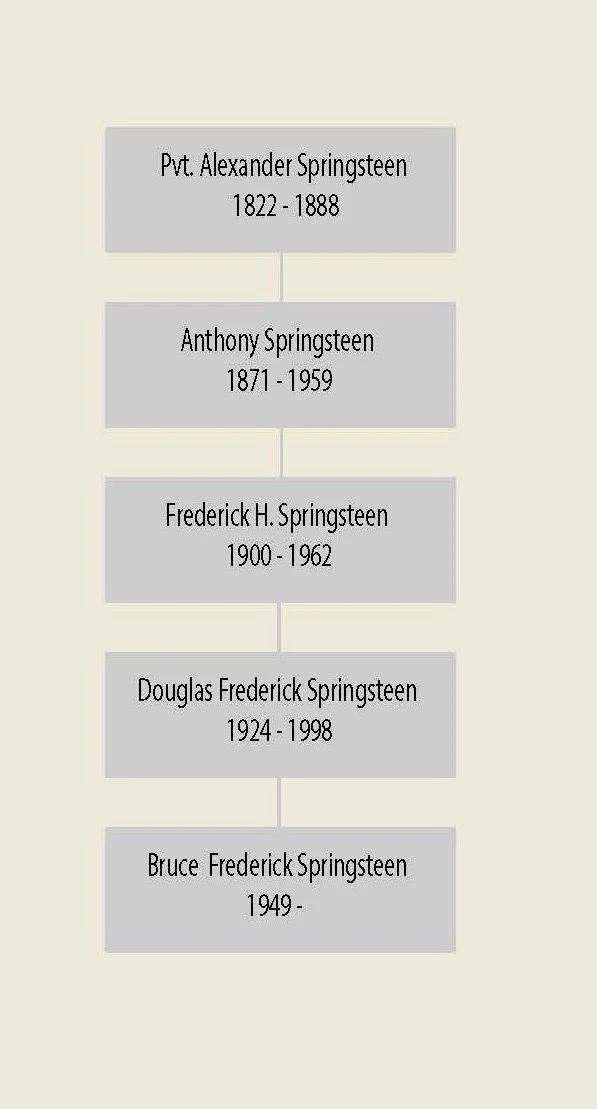Civil War Ancestors: Alexander Springsteen, 14th New Jersey
Private Alexander Springsteen, Company A, 14th New Jersey, and great-great-grandfather to New Jersey’s Favorite Son, Bruce Springsteen
By Jeffrey R. Biggs (Hardtack Books)
“ Staying rooted in New Jersy is a Springsteen family pastime.”
14th New Jersey at the Battle of Monocacy from Deeds of Valor (1901)
As far back as before the Civil War, we find Monmouth County, New Jersey, peppered with the Springsteen surname. The Monmouth County Historical Association uncovered a document dating to 1801 signed by a John Springsteen, a patriot of the Revolution and direct ancestor to Bruce Springsteen. Of particular note to Bruce Springsteen’s Civil War heritage is that the grandson of John Springsteen was Alexander Springsteen (1822 - 1888), the great-great-grandfather to Bruce Springsteen (1949 - ). The muster rolls of the 14th New Jersey show Alexander Springsteen enrolled for service on August 14, 1862, and was discharged on June 18, 1865. The regiment was organized under the July 1862 call issued by President Lincoln for 300,000 troops to serve for three years or the remainder of the war after the disastrous retreat of McClellan’s army on the Virginia peninsula. The regiment received notoriety by delaying Jubal Early’s advance on Washington at the Battle of Monocacy, July 9, 1864, where it received its nickname of “The Monocacy Regiment”. In 1907, the 14th New Jersey was given the honor of placing the first monument on the Monocacy Battlefield, where 180 surviving members attended the ceremony. James McPherson called the regiment “one of the best regiments in one of the best fighting corps in the Union army - the 6th Corps of the Army of the Potomac”.
A middle-aged man in 1862, Alexander Springsteen was an atypical candidate for going off to war. He enlisted at the age of forty with a wife at home in Ocean Township, New Jersey, and four young children (3 sons and 1 daughter) between the ages of three and ten. The 1860 census of Monmouth County lists Alexander Springsteen, a carpenter by trade, as a day laborer with a personal estate of only $100.00. At the time of his enlistment, the pay of a private in the Union Army was competitive to that of a self-employed carpenter. In August 1862, each recruit was entitled to receive - after enlistment and swearing in - one month’s pay of $13.00 in advance and a bounty of $25.00 when the regiment was mustered into service. For a private with a wife or widowed dependent mother, the State of New Jersey paid an additional amount of $6 per month. Upon completion of his service, the federal government paid $75.00 for each volunteer honorably discharged.
The 14th New Jersey was comprised of Monmouth County stock, many from the town of Freehold. The regiment was formed and drilled on the old Revolutionary War battleground of Monmouth just outside of Freehold. Its first year of service was a peaceful one spent guarding the railroad bridges near Monocacy, Maryland, and various points along the Upper Potomac River. Transferred to the Army of the Potomac after the Battle of Gettysburg, the regiment was involved in the pursuit of Lee in Pennsylvania and the later campaigns of that fall. After 15 months of service, the 14th New Jersey saw its first casualties near Culpepper, Virginia, on November 27, 1863. For the next year and a half, the fortunes of the 14th New Jersey were linked to the fighting 6th Corps. The New Jersey regiment saw action in Grant’s Overland Campaign, the Battle of Monocacy, Phil Sheridan’s Shenandoah Valley campaign, and finally outside Petersburg, culminating at Appomattox Court House. In the end, the 14th New Jersey would sustain casualties of 147 men killed or mortally wounded in action, placing it in the top 10 percent in casualties of Union regiments. The great-great-grandfather of one of the most famous sons of New Jersey served his time in the regiment with honor but little distinction and was granted a discharge from the service at the end of the war.
In 1871, Alexander Springsteen and his wife Harriet would have another son, Anthony Springsteen (1871 - 1959), who would live to see the birth of his great-grandson, Bruce Springsteen, in 1949. Alexander returned home to New Jersey after the war and eventually took up residence in Howell Township where he died at the age of sixty-six in 1888. He was active in the local G.A.R. of Freehold, who took charge of his remains. He is buried in Monmouth County in the Ardena Baptist CemeteryThe Springsteen Family Tree


